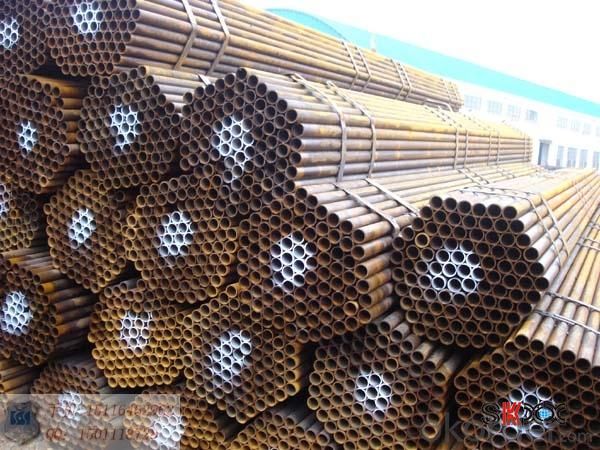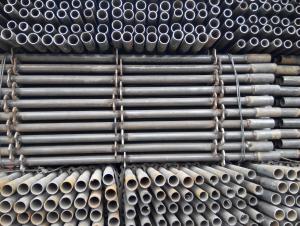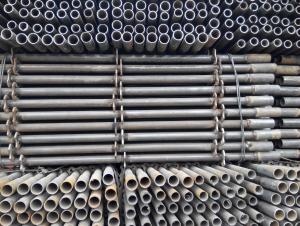Seamless ASTM SPEC 5CT American Standard Steel Pipe/Tube
- Loading Port:
- China Main Port
- Payment Terms:
- TT or LC
- Min Order Qty:
- 25 m.t.
- Supply Capability:
- 9800 m.t./month
OKorder Service Pledge
OKorder Financial Service
You Might Also Like
1、Structure of Seamless ASTM SPEC 5CT American Standard Steel Pipe/Tube :
Seamless ASTM SPEC 5CT American Standard Steel Pipe/Tube is to be used for conveying gas, water, and petroleum foroil and natural gas industries. And used for structural steel pies purpose. As the manufacturing process does not include any welding, seamless pipes are perceived to be stronger and more reliable. Historically seamless pipe was regarded as withstanding pressure better than other types, and was often more easily available than welded pipe.
2、Main Features of Seamless ASTM SPEC 5CT American Standard Steel Pipe/Tube :
• High manufacturing accuracy
• High strength
• Small inertia resistance
• Strong heat dissipation ability
• Good visual effect
• Reasonable price
3、Seamless ASTM SPEC 5CT American Standard Steel Pipe/Tube ,Specification:
Standard | GB, DIN, ASTM ASTM A106-2006, ASTM SPEC 5CT-2007 |
Grade | 10#-45#, 16Mn 10#, 20#, 45#, 16Mn |
Thickness | 8 - 33 mm |
Section Shape | Round |
Outer Diameter | 133 - 219 mm |
Place of Origin | Shandong, China (Mainland) |
Secondary Or Not | Non-secondary |
Application | Hydraulic Pipe |
Technique | Cold Drawn |
Certification | API |
Surface Treatment | factory state or painted black |
Special Pipe | API Pipe |
Alloy Or Not | Non-alloy |
Length | 5-12M |
Outer Diameter | 21.3-610mm |
Grade | 20#, 45#, Q345, API J55, API K55, API L80, API N80, API P110, A53B |
Standard | ASME, ASTM |
1) Material:20#(ASTM A 106/A53 GRB.API5LGRB,GB),45#,16Mn,10#.
2) Specification range:OD:21.3-610mm,WT:6-70mm,length:6-12m or according to the requirement of clients.
3) Excutive standards:GB,ASME API5L.ASTM A 106/A53,Despite of the above standards,we can also supply seamless steel pipe with standard of DIN,JIS,and so on,and also develop new products according to the requirements of our clients!
4) Surface:black lacquered,varnish coating or galvanized.
5) Ends:Beveled or square cut,plastic capped,painted.
6) Packing:bundles wrapped with strong steel strip,seaworthy packing.
4、Packaging & Delivery
Packaging Details: | seaworthy package,bundles wrapped with strong steel strip |
Delivery Detail: | 15-30days after received 30%TT |
5、FAQ of Seamless ASTM SPEC 5CT American Standard Steel Pipe/Tube :
①How is the quality of your products?
Our products are manufactured strictly according to national and internaional standard, and we take a test
on every pipe before delivered out. If you want see our quality certifications and all kinds of testing report, please just ask us for it.
Guaranteed: If products’ quality don’t accord to discription as we give or the promise before you place order, we promise 100% refund.
②How about price?
Yes, we are factory and be able to give you lowest price below market one, and we have a policy that “ for saving time and absolutely honest business attitude, we quote as lowest as possible for any customer, and discount can be given according to quantity”,if you like bargain and factory price is not low enough as you think, just don’t waste your time.Please trust the quotation we would give you, it is professional one.
③Why should you chose us?
Chose happens because of quality, then price, We can give you both.Additionally, we can also offer professional products inquiry, products knowledge train(for agents), smooth goods delivery, exellent customer solution proposals.Our service formula: good quality+good price+good service=customer’s trust
SGS test is available, customer inspection before shipping is welcome, third party inspection is no problem.
6、 Seamless ASTM SPEC 5CT American Standard Steel Pipe/Tube : Images:


- Q:What are the different types of supports used for aboveground steel pipes?
- There are several types of supports commonly used for aboveground steel pipes, including pipe hangers, pipe clamps, pipe saddles, and pipe shoes. These supports are designed to provide stability and prevent excessive movement or vibration of the pipes, ensuring their proper alignment and preventing damage.
- Q:Are steel pipes resistant to ultraviolet (UV) radiation?
- No, steel pipes are not inherently resistant to ultraviolet (UV) radiation.
- Q:What are the common standards for manufacturing steel pipes?
- The common standards for manufacturing steel pipes include specifications set by international organizations such as the American Society for Testing and Materials (ASTM), the International Organization for Standardization (ISO), and the European Committee for Standardization (EN). These standards cover aspects such as material composition, dimensions, mechanical properties, and testing methods to ensure quality and compatibility in steel pipe production.
- Q:How are steel pipes used in the manufacturing of offshore wind turbines?
- Steel pipes are used in the manufacturing of offshore wind turbines for various purposes such as supporting the turbine structure, housing electrical cables, and transporting fluids like hydraulic oil and cooling water. These pipes provide structural strength, corrosion resistance, and durability, ensuring the stability and functionality of the turbines in the harsh offshore environment.
- Q:What are the challenges faced in transporting steel pipes?
- Transporting steel pipes can pose several challenges. Firstly, steel pipes are heavy and bulky, making them difficult to handle and load onto transportation vehicles. Specialized equipment, such as cranes or forklifts, is often required to safely lift and maneuver the pipes. Secondly, steel pipes are susceptible to damage during transport. They can be easily scratched, dented, or bent if not properly secured. This necessitates careful packaging and securing techniques to prevent any deformation or damage during transit. Additionally, steel pipes are prone to corrosion, especially when exposed to moisture or harsh weather conditions. Therefore, protecting the pipes from moisture and maintaining proper storage conditions during transportation is crucial to prevent rusting and maintain their quality. Furthermore, the length of steel pipes can also present challenges. Depending on their size, some pipes may be too long to fit on standard transportation vehicles. This requires the use of specialized trailers or the pipes may need to be cut into smaller sections, which can add complexity and cost to the transport process. Lastly, the cost of transporting steel pipes can be high due to their weight and size. Freight charges can be expensive, especially for long-distance transportation. Thus, finding cost-effective transportation solutions while ensuring the safety and integrity of the pipes is a constant challenge in the industry.
- Q:Can steel pipes be used for conveying solids?
- Yes, steel pipes can be used for conveying solids. Steel pipes are known for their high strength and durability, making them suitable for transporting various solid materials such as ores, coal, grains, and minerals. The smooth interior surface of steel pipes allows for efficient and smooth flow of solids, ensuring effective conveyance over long distances.
- Q:How are steel pipes used in the food and beverage industry?
- Steel pipes are commonly used in the food and beverage industry for various applications such as transporting liquids and gases, including water, beverages, and food ingredients. They are chosen for their durability, resistance to corrosion, and ability to maintain hygiene standards. Steel pipes are used to facilitate the flow of materials throughout the production process, ensuring safe and efficient operations in the food and beverage industry.
- Q:Where is a steel pipe casing usually used?
- The casing, usually used in the basement construction, to protect the pipeline or convenient pipeline installation hoops.
- Q:What are the advantages of using steel pipes in construction projects?
- Using steel pipes in construction projects offers numerous benefits. Firstly, the strength and durability of steel pipes are remarkable. With a high tensile strength, they can withstand heavy loads and pressures without any deformation or breakage. This makes them ideal for projects that require structural integrity, such as building construction, bridge building, and infrastructure development. Secondly, steel pipes exhibit exceptional resistance to corrosion. They are typically coated with protective layers, like galvanized zinc or epoxy, which prevent rusting and extend their lifespan. Consequently, steel pipes are suitable for both aboveground and underground applications, including water and sewage systems, oil and gas pipelines, and industrial processing plants. Furthermore, steel pipes offer great versatility in terms of shape and size. They can be manufactured in various diameters and thicknesses, allowing for customization to meet specific project requirements. This flexibility in design makes steel pipes suitable for a wide range of applications in construction, including plumbing, HVAC systems, and structural supports. Moreover, steel pipes are relatively easy to install and maintain. They can be welded, threaded, or bolted together, providing a secure and leak-proof connection. This ease of installation reduces construction time and labor costs. Additionally, steel pipes require minimal maintenance, as they are resistant to cracking, chipping, and warping. This makes them a cost-effective choice over the long term. Lastly, steel pipes are environmentally friendly. They are 100% recyclable, meaning they can be reused and repurposed without compromising their structural integrity. By recycling steel pipes, the demand for new raw materials is reduced, and waste generation is minimized. Therefore, steel pipes are a sustainable option for construction projects. In summary, the advantages of using steel pipes in construction projects encompass their strength, corrosion resistance, versatility, ease of installation and maintenance, and environmental sustainability. These attributes make steel pipes a reliable and cost-effective choice for a wide range of applications in the construction industry.
- Q:What is the bending strength of steel pipes?
- The bending strength of steel pipes can vary depending on factors such as the grade and thickness of the steel, as well as the specific manufacturing process. However, in general, steel pipes are known for their high bending strength due to the inherent strength and durability of the material.
1. Manufacturer Overview |
|
|---|---|
| Location | |
| Year Established | |
| Annual Output Value | |
| Main Markets | |
| Company Certifications | |
2. Manufacturer Certificates |
|
|---|---|
| a) Certification Name | |
| Range | |
| Reference | |
| Validity Period | |
3. Manufacturer Capability |
|
|---|---|
| a)Trade Capacity | |
| Nearest Port | |
| Export Percentage | |
| No.of Employees in Trade Department | |
| Language Spoken: | |
| b)Factory Information | |
| Factory Size: | |
| No. of Production Lines | |
| Contract Manufacturing | |
| Product Price Range | |
Send your message to us
Seamless ASTM SPEC 5CT American Standard Steel Pipe/Tube
- Loading Port:
- China Main Port
- Payment Terms:
- TT or LC
- Min Order Qty:
- 25 m.t.
- Supply Capability:
- 9800 m.t./month
OKorder Service Pledge
OKorder Financial Service
Similar products
New products
Hot products
Related keywords
































